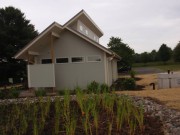Update on Regrowth, Odors, and Sudden Increase (ROSI) in Biosolids Research
In January, 2011, Biosolids Corner had reported on a WERF-sponsored study entitled, “Wastewater Treatment Plant Design And Operation Modifications To Improve Management Of Biosolids Regrowth, Odors And Sudden Increase (ROSI) In Indicator Organisms” (WERF SRSK4T08), that was just getting underway. Much work has been done over the past year and a half and, on June 8, 2012, the project team submitted a draft of the Final Report on this ongoing study. The principal investigators for the WERF project are Matthew J. Higgins, Ph.D. from Bucknell University and Sudhir N. Murthy, Ph.D., P.E. from DC Water. Garvey Resources was one of several team members on this project.
The WERF study included two phases. The first phase focused on filling critical research gaps, and providing insights for developing solutions for controlling ROSI. A previous WERF study in 2005 had suggested that, although indicator bacteria levels were very low or undetectable after thermophilic treatment/anaerobic digestion, some portion of the bacteria were not destroyed but had actually entered a non-culturable state. It was postulated that this “suspended animation” was reversed by centrifuge dewatering, resulting in a “sudden increase” (SI) in bacterial densities to a level that often exceeded regulatory requirements for acceptable levels of Class A biosolids. The second phase of the study, which focused on developing, implementing and evaluating solutions in the field, provided evidence to support the hypothesis that SI is indeed a result of incomplete inactivation of bacterial indicators.
Recent research confirmed an earlier observation that SI occurs with fecal coliform (a primary indicator organism) but not Salmonella. Therefore, the new testing focused on E. coli, the main fecal coliform organism, and used different alternative culturing methods to evaluate the density of the bacterial growth. Time-temperature studies were also conducted to determine which combination was most effective at inactivating the bacteria. Tests using higher temperatures and longer time frames than are currently recommended were able to eliminate SI.
The study concluded that “Method 1680 (the standard culturing method recommended by the EPA) is potentially underestimating the density of viable organisms in a sample after thermophilic treatment.” That being said, if a facility uses Salmonella as the indicator organism, the current time-temperature requirement would meet the bacterial requirement. However, since public acceptance of the safety of biosolids is a critical issue for biosolids management, the study proposes that “utilities use a best practice model that achieves the requirements for both fecal coliforms and Salmonella.”
The other focus of the current ROSI study is on reducing odors. Although biosolids odors are mainly associated with primary sludge, rather than waste activated sludge, public perception will drive the research in reducing odors at all levels. Gas chromatography-olfactometry identified the main persistent odorants in centrifuged biosolids to be indole, skatole, p-cresol, and butyric acid, all of which are breakdown products of organics such as proteins, carbohydrates and fats. It was suggested that eliminating these precursors will help reduce odors. Field tests were conducted in which several amendments were added to the solids either during or after the dewatering process. Some of these amendments resulted in significantly reduced odors and/or reduced regrowth in the biosolids. In another test, incubating digested biosolids with protein degrading enzymes reduced odor after dewatering and also resulted in the added benefit of an increase in gas production, which itself could be recovered for reuse. The results are preliminary and more research is needed in this area.
The beneficial reuse of biosolids is often a key component in biosolids management plans. Already, the U.S. recycles about 60 percent of its biosolids, mainly in land application programs. This and other beneficial reuse methods are expected to increase as wastewater treatment plants incorporate more sustainable practices into their management plans. Therefore, the recently reported results of the ongoing WERF study addressing the problem of regrowth, odors, and sudden increase after anaerobic digestion are important for biosolids managers who are dealing with issues of public acceptance, especially in the areas of odor control and the perceived safety risk of biosolids reuse.
NOTE: This article was based on the final report of the WERF ROSI study. At the time of publication of this article, the final report may be available online. To view the final report, go to www.werf.org
WBE
PA Certified Woman Business Enterprise
WOSB
FEDERALLY CERTIFIED WOMEN-OWNED SMALL BUSINESS

Nutrient Management Planning Specialist
Odor Management Planning Specialist
Follow Garvey Resources, Inc. on Facebook
Keep informed about the latest biosolids news and trends by following Diane Garvey's Biosolids Blog.
Diane's most recent post is entitled, "The Latest Information About Covid-19 as It Relates to Biosolids"
Biosolids Blog
News & Events
Diane Garvey was recently awarded the David A. Long Memorial Educational Service Award by the Pennsylvania Water Environment Association!
This award was established in honor of Dr. David A. Long in recognition of his lifelong service and dedication toward the education and training of wastewater and water treatment plant operators and environmental professionals.
This award is presented to individuals who distinguish themselves through their efforts and contributions to the education of water quality professionals.
DC Water has launched its new branded biosolids product: BLOOM. And you can learn about this project at the new website:
For more information on any of the above topics, please contact Diane Garvey at diane@garveyresources.com or call 215-362-4444.
Garvey Resources was a partner in the development of the Rodale Institute's Water Purification ECO-Center. Read about it on our Biosolids Blog.
Contact Us or Make an Appointment
We invite you to call or e-mail us today to discuss optimizing your biosolids program.
For answers to your questions or to schedule an appointment, please call:
215-362-4444
Or send us an email at info@garveyresources.com.


